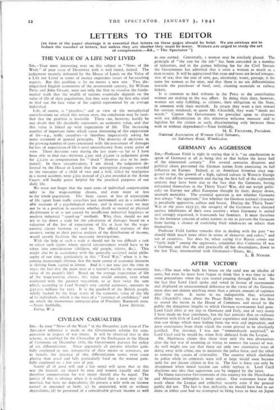GERMANY AS AGGRESSOR
Sra,—Professor Field is right in saying that it is " an anachronism to speak of Germany at all as being this or that before the latter half of the nineteenth century." For several centuries disunion and political chaos prevented the German nation from exercising its full influence on Europe. Indeed, as an American historian once sug- gested to me, the growth of a high, refined culture in Western Europe at the end of the seventeenth and during the first half of the eighteenth century may have been due to the fact that the Germans, having exhausted themselves in the Thirty Years' War, did not weigh politi- cally on Europe nor affect European thought by their, deeper down, uncouth mentality. The essential question is not whether Germany was always " the aggressor," but whether the German national character is peculiarly aggressive, callous and brutal. During the Thirty Years' War or the years 1933-37, the savagery of the Germans was directed against inhabitants of their own country ; when Germany is united and strongly organised, it transcends her frontiers. It must therefore be the foremost concern of other nations to try to prevent the Germans from having a chance of exercising their tendencies on others than themselves.
Professor Field further remarks that in dealing with the past- " we should think much more often in terms of dynasties and rulers," and not of countries. But does he, when saying that Russia comes out " fairly high " among the aggressors, remember that Catherine II was a German, and that she and practically all her descendants, down to the last Tsar, intermarried with Germans?—Yours, &c.,
L. B. NAMIER.






























 Previous page
Previous page